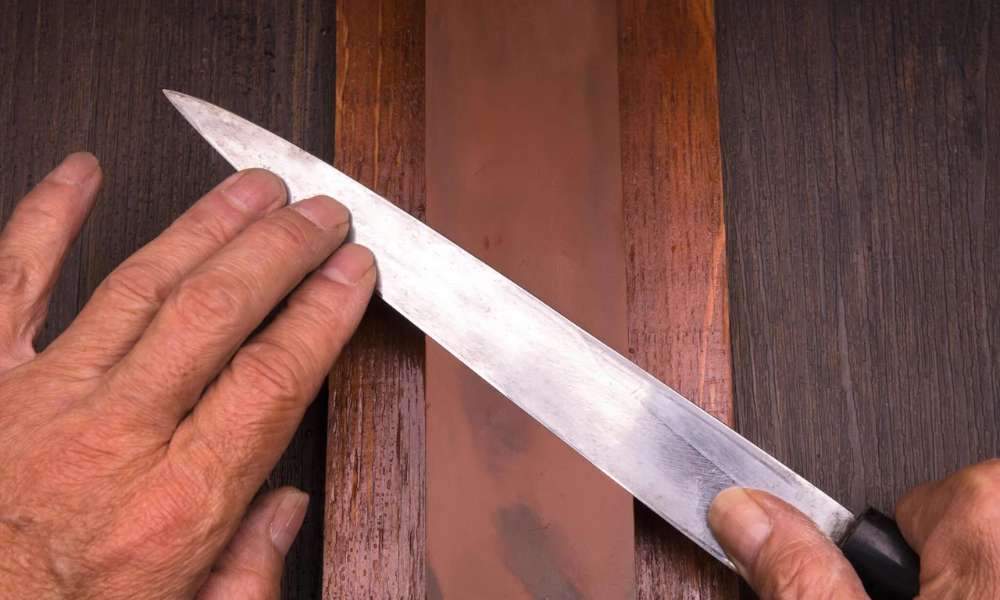Welcome to our comprehensive guide on how to effectively remove rust from knives. Rust can significantly diminish the performance and longevity of your cherished blades, making it imperative to address this issue promptly and efficiently. In this article, we will delve into various proven methods to remove rust from knives, providing you with practical solutions to restore your blades to their former glory. By learning how to remove rust from knives, you not only enhance their aesthetic appeal but also ensure they remain sharp, safe, and reliable for all your culinary endeavors. Whether you’re a professional chef or a cooking enthusiast, understanding the importance of rust removal and acquiring the skills to do so will undoubtedly benefit you in the long run. Let’s explore the process and regain the pristine condition of your knives together.
How Does Rust Develop On Knives?
Rust on knives is a common occurrence that is primarily caused by exposure to moisture and oxygen. When the metal in the knife comes into contact with water or high humidity, a chemical reaction known as oxidation occurs, leading to the formation of corrosion. This process is accelerated when the knife is not properly dried after use or stored in a damp environment.
Can Rust Damage The Quality Of A Knife?
Rust can indeed damage the quality of a knife. When moisture comes into contact with the metal blade of a knife, it can lead to the formation of rust, which is essentially iron oxide. Rust weakens the structural integrity of the blade, making it more prone to chipping and breaking. Additionally, corrosion can also affect the sharpness and overall performance of the knife, as it creates rough spots on the blade that hinder its cutting ability.
Methods For Removing Rust
1. Using Vinegar Or Lemon Juice
One of the most accessible and natural methods for removing rust from knives is to use vinegar or lemon juice. Both of these acidic substances work effectively to dissolve corrosion, making it easier to scrub away. To utilize this method, start by soaking the rusty areas of the knife in either vinegar or lemon juice for some time. The acidity will begin to break down the rust, loosening its grip on the metal surface. After soaking, gently scrub the affected areas with a sponge or brush to remove the loosened corrosion particles. Finally, rinse the knife thoroughly with water and dry it completely to prevent further rusting.
2. Employing Baking Soda
Baking soda, also known as sodium bicarbonate, is another household ingredient that can be highly effective in removing rust from knives. This alkaline substance works by creating a chemical reaction that helps to loosen and lift the corrosion from the surface of the blade. To use baking soda for corrosion removal, create a paste by mixing it with a small amount of water until you achieve a thick consistency. Apply the paste to the rusty areas of the knife blade and allow it to sit for a few hours. Then, using a soft cloth or sponge, gently scrub the paste onto the rusted areas, focusing on areas with stubborn buildup. After scrubbing, rinse the knife with water and dry it thoroughly. Baking soda is a gentle yet effective corrosion remover that can help restore your knives to their original condition without causing any damage to the metal.
3. Utilizing Commercial Rust Removers
For those seeking a more convenient solution, commercial rust removers offer a hassle-free way to tackle stubborn rust stains on knives. These specialized products are formulated with powerful rust-dissolving agents that penetrate deep into the metal, effectively breaking down corrosion particles for easy removal. Unlike homemade remedies, commercial rust removers often come in spray or gel form, allowing for targeted application and minimal mess. Additionally, many commercial corrosion removers contain corrosion inhibitors that help prevent future oxidation, prolonging the lifespan of your knives and preserving their pristine appearance.
Setting Up Protective Measures
Setting up protective measures is essential before beginning the rust removal process for knives. Firstly, ensure you have adequate ventilation in your workspace to prevent inhaling any fumes from the corrosion removal agents. Additionally, wear protective gloves to shield your hands from any chemicals used in the process. A pair of safety goggles can also protect your eyes from splashes or debris. Furthermore, lay down a protective covering on your work surface to prevent any damage from spills or scratches. Taking these precautions will not only keep you safe but also maintain the integrity of your workspace.
Removing Surface Debris
Surface debris is a common issue that can affect the performance and appearance of objects such as knives. Rust formation on knives, in particular, can be a frustrating problem for many enthusiasts. One effective method for removing surface corrosion from knives is by using a combination of vinegar and baking soda. This natural solution helps to break down the corrosion without damaging the blade, making it an ideal option for those looking to restore their knives to their former glory.
Using Household Items For Rust Removal
Household items can be surprisingly effective in removing rust from knives without the need for specialized products. One common method is to create a paste using baking soda and water, then apply it to the rusty areas of the knife. Allow the paste to sit for several minutes before scrubbing with a soft cloth or brush. Another household item that can be used is vinegar, which contains acetic acid that helps dissolve corrosion. Soak the corrosion knife in a vinegar solution for a few hours, then scrub with a brush to remove any remaining corrosion. Lemon juice and salt can also be combined to create a corrosion-fighting paste that is gentle yet effective.
Cleaning Residue From The Knife
Cleaning residue from a knife requires careful attention to detail. One effective method for removing rust from kitchen knives is using a mixture of baking soda and water. Simply create a paste by mixing the two ingredients and applying it to the affected areas with a soft cloth or sponge. Gently scrub the surface in circular motions until the corrosion is removed.
Storing Knives Properly To Avoid Rust
Storing knives properly is essential to prevent rust and maintain their sharpness. One effective way to avoid corrosion buildup is to store knives in a dry environment away from moisture. Consider investing in a knife block or magnetic strip for safe storage, as storing a knife loosely in drawers can lead to scratches and an increased risk of corrosion.
Handling Rust On Damascus Steel Knives
Damascus steel knives are prized for their beautiful patterns and exceptional performance, but they are not immune to corrosion. When dealing with corrosion on Damascus steel knives, it’s crucial to exercise caution to avoid damaging the intricate patterns and delicate edges. Start by gently scrubbing the rusted areas with a soft-bristled brush or a nylon scouring pad. Avoid using abrasive cleaners or steel wool, as these can scratch the surface of the blade and dull its appearance. For stubborn corrosion spots, create a paste using baking soda and water and apply it to the affected areas, allowing it to sit for a few minutes before gently scrubbing away the corrosion. Once the corrosion has been removed, thoroughly rinse the knife and dry it immediately to prevent further corrosion formation. With proper care and maintenance, your Damascus steel knife can retain its beauty and performance for years to come.
The Final Thought
Removing rust from knives requires patience, proper tools, and the right technique. By utilizing methods such as using vinegar, baking soda, or a commercial corrosion remover, you can effectively restore your knives to their former glory. It is important to always follow safety precautions when dealing with corrosion removal chemicals and to thoroughly clean and dry your knives after the process. Regular maintenance and proper storage will help prevent future rusting issues. With these tips in mind, you can ensure that your knives remain in top condition for years to come. Take care of your knives and they will take care of you.





